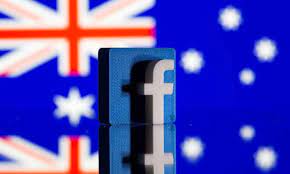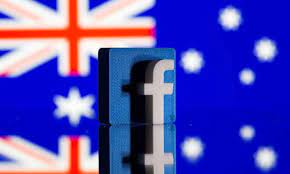
Facebook Inc. has ended its negotiating process for licensing agreements with publishers, the social media giant has informed the Australian publishers through an email sent to the industry, said reports. This announcement came six months following the passing of a law that to require tech companies to pay for news content.
Facebook announced deals with many of the country's top news outlets. However, SBS TV and other smaller publishers were left out of the deal, raising questions about its effectiveness and scope.
Australia is the only country that has a law that allows the government to set fees in the event of a failure by tech giants or news providers. However, rejected companies have little recourse and wait for the government's review of the law in 2022.
Andrew Hunter, Facebook's regional chief of news partnerships, stated in August that it had "now completed" deals with Australian companies to pay for content it publishes on its newly launched "Facebook News".
Broadsheet Media founder Nick Shelton said that the decision to stop new deals was "clearly an effort by Facebook to limit their exposure to independent publishers".
SBS is one of Australia's five free-to-air national broadcasters. It's the country's primary source of foreign-language news. SBS stated that Facebook refused to enter negotiations despite months-long attempts. It stated that it had reached a deal with Google (GOOGL.O).
"This outcome is against the Government's intent to support public interest journalism and in particular include the public service broadcasters within the Code framework with regard to remuneration," a spokesperson for SBS stated in a statement Wednesday.
Hunter stated in an email to publishers (which has not been made publicly) that publishers who were rejected would continue to receive clicks from Facebook. He also recommended that they tap into a new series industry grants.
Hunter also stated that content deals are "just one way that Facebook supports publishers" and that he and Reuters have been in constant discussions with publishers about what types of news content can provide the most value to them and to Facebook.
Facebook didn't respond to questions regarding statements by Broadsheet Media or SBS.
The U.S. social media company, Social Media giant, has signed deals with a number of Australian big media companies like News Corp (NWSA.O), and the Australian Broadcasting Corp. It also has a collective bargaining agreement with rural publishers. Only a few smaller and independent publishers have signed deals.
The Conversation, which publishes academic commentary on public affairs, was also rejected by publishers, Reuters previously reported. The regulator that drafted the law reacted negatively to this. Wednesday's comment was not made by the Australian Competition and Consumer Commission.
The law required Facebook and Google to negotiate with news outlets to provide content that drives traffic to their sites. Otherwise, they could be subject to government intervention.
Before any government intervention can take place, however, the federal treasurer must first determine whether either Facebook nor Google have failed to negotiate in good-faith. This is known as "designation". Josh Frydenberg, Treasurer of the United States, was unavailable for comment immediately.
Facebook's rejections of SBS and Conversation are in direct contradiction to law's core proposition, that it "should have to compensate public interest journalism", stated Peter Lewis, director at the Centre for Responsible Technology (a think tank).
"The treasurer cannot choose but to re-designate Facebook in order to ensure it fulfills its obligations to Australian public interest journalism."
(Source:www.ndtv.com)
Facebook announced deals with many of the country's top news outlets. However, SBS TV and other smaller publishers were left out of the deal, raising questions about its effectiveness and scope.
Australia is the only country that has a law that allows the government to set fees in the event of a failure by tech giants or news providers. However, rejected companies have little recourse and wait for the government's review of the law in 2022.
Andrew Hunter, Facebook's regional chief of news partnerships, stated in August that it had "now completed" deals with Australian companies to pay for content it publishes on its newly launched "Facebook News".
Broadsheet Media founder Nick Shelton said that the decision to stop new deals was "clearly an effort by Facebook to limit their exposure to independent publishers".
SBS is one of Australia's five free-to-air national broadcasters. It's the country's primary source of foreign-language news. SBS stated that Facebook refused to enter negotiations despite months-long attempts. It stated that it had reached a deal with Google (GOOGL.O).
"This outcome is against the Government's intent to support public interest journalism and in particular include the public service broadcasters within the Code framework with regard to remuneration," a spokesperson for SBS stated in a statement Wednesday.
Hunter stated in an email to publishers (which has not been made publicly) that publishers who were rejected would continue to receive clicks from Facebook. He also recommended that they tap into a new series industry grants.
Hunter also stated that content deals are "just one way that Facebook supports publishers" and that he and Reuters have been in constant discussions with publishers about what types of news content can provide the most value to them and to Facebook.
Facebook didn't respond to questions regarding statements by Broadsheet Media or SBS.
The U.S. social media company, Social Media giant, has signed deals with a number of Australian big media companies like News Corp (NWSA.O), and the Australian Broadcasting Corp. It also has a collective bargaining agreement with rural publishers. Only a few smaller and independent publishers have signed deals.
The Conversation, which publishes academic commentary on public affairs, was also rejected by publishers, Reuters previously reported. The regulator that drafted the law reacted negatively to this. Wednesday's comment was not made by the Australian Competition and Consumer Commission.
The law required Facebook and Google to negotiate with news outlets to provide content that drives traffic to their sites. Otherwise, they could be subject to government intervention.
Before any government intervention can take place, however, the federal treasurer must first determine whether either Facebook nor Google have failed to negotiate in good-faith. This is known as "designation". Josh Frydenberg, Treasurer of the United States, was unavailable for comment immediately.
Facebook's rejections of SBS and Conversation are in direct contradiction to law's core proposition, that it "should have to compensate public interest journalism", stated Peter Lewis, director at the Centre for Responsible Technology (a think tank).
"The treasurer cannot choose but to re-designate Facebook in order to ensure it fulfills its obligations to Australian public interest journalism."
(Source:www.ndtv.com)





